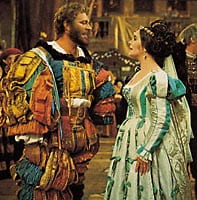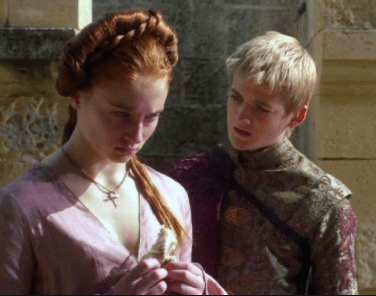Shakespeare & Game of Thrones – Weekly Reflection #4
Since the very beginning of our project “Shrew You!” I’ve been noticing connections between Shakespeare’s plays and the HBO show Game of Thrones (GOT). In class, we talk about how influential Shakespeare has been because of his universal themes about life the universe and everything and it got me thinking about whether those connections I was making to GOT may be related to Shakespeare’s works. Welcome to weekly reflection #4 where I explore my thoughts on Shakespeare’s The Taming of The Shrew and Game of Thrones! Warning mild GOT spoilers ahead.
Game of Thrones & My Connections to The Taming of The Shrew
This year I started watching Game Of Thrones (GOT) with my partner (I know I’m super late to the party) and I’ve been loving it. The show has so much detail and there is always an interesting story to follow (except Bran’s story and I stand by that). With our recent study of The Taming of the Shrew (TOTS) by William Shakespeare, I can’t help but notice some similarities between the two.
Sansa’s Betrothal to Prince Joffrey


Sansa Stark much like Kate in TOTS had a man chosen for her. As an alliance between the Starks and the Baratheons, Sansa was set to marry Prince Joffrey Baratheon. Unlike Kate, Sansa was excited to be married and fair enough considering Joffrey was going to be king. Though Kate wasn’t as excited to be married to Petruchio we can see the similarities of marriage. In the 16th century and how Shakespeare describes in the play, marriage was a business transaction based on wealth and status and it’s just the same in GOT.
Renaming Your Identity
Your name is your identity, the very first thing you were interpreted by before you had thoughts of your own. Have you ever noticed that anyone named Jessica on tv is a popular snob? Yeah… that’s why I go by Jesse. Anyway…
Imagine you’re name was taken from you, someone one day decided that your name wasn’t to their liking so they changed it. If you associated with that name (and there are many people who don’t identify with their birth name) you’d feel ripped off your identity. We see this in the history of residential schools in Canada. In an effort to assimilate indigenous children into the white Christian way of life they were stripped of their culture by cutting their hair and changing their names (Miller).
The Lost Name in TOTS & GOT
As one of his many methods of taming Kate, Petruchio addresses her not as Katherine but as Kate stating it over and over again.
“You lie, in faith, for you are call’d plain Kate,
And bonny Kate, and sometimes Kate the curst.
But Kate, the prettiest Kate in Christendom, Kate of Kate Hall, my super-dainty Kate,
For dainties are all Kates: and therefore, Kate,
Take this of me, Kate of my consolation”
The number of times he repeats this pet name, completely disregarding the name she introduced herself as strips her of her identity so he can control her, thus taming her.

If you’re familiar with Game of Thrones in any way, you are most definitely familiar with Ramsay Bolton, the sadistic, manipulative bastard child of Roose Bolton and you are probably more familiar with Theon Greyjoy – who was kidnapped by Ramsay, enslaved and renamed Reek. After being constantly told by Ramsay that his name isn’t Theon Greyjoy and is instead Reek, it becomes nearly impossible for a once close friend like Sansa Stark to remind him of his true identity. Out of fear of what Ramsay would do to him, he insists he is Reek and this… is a truly terrifying form of manipulation that leaves lasting trauma on the character.
Shame For Your Crimes
If there is one very similar thing between TOTS and GOT it’s that they love to publicly shame people who have violated community regulations or laws. In Act 1, scene 1 of The Taming of the Shrew Kate’s father practically begs suitors to court Kate to which Gremio (a potential suitor for Kate’s sister) replies “To cart her rather. She’s too rough for me”. “Cart” was a term used in old modern English referring to the act of parading bawds and whores in open carts around the streets to publicly humiliate and shame them.

This exact idea of “justice” can be seen in GOT when Cersei is sentenced to “the walk of atonement”. The walk of atonement is a civil punishment in the 7 kingdoms meant to publicly shame women accused of adultery and prostitution. Cersei is forced to walk naked from The Great Sept of Baelor to The Red Keep which in short, is a very long walk. Cersei is followed by women of the church shouting “Shame” and ringing bells while virtually the whole city watches, throwing almost anything they have at her.
Shakespeare has had a huge influence on us because of his universal themes of life the universe and everything. We continue to study his works today and storytellers are constantly adapting his works and themes into stories of their own. Though I believe the similarities in Game of Thrones and The Taming of the Shrew are based more on inspirations from the 16th century I wouldn’t be surprised if some elements of Shakespeare snuck their way in too. Leave a comment telling me your thoughts on the similarities between these two texts. Do you think elements of Shakespeare’s plays had an influence on Game of Thrones?
Work Cited
Miller, J. R. “Residential Schools in Canada.” The Canadian Encyclopedia, 10 Oct. 2012, www.thecanadianencyclopedia.ca/en/article/residential-schools
Shakespeare, William, and CliffsNotes. The Taming of the Shrew. Diana Sweeney ed., New York, NY, Hungry Minds Inc., 2001.
“Walk of Atonement | Game of Thrones Wiki | Fandom.” Game of Thrones Wiki, gameofthrones.fandom.com/wiki/Walk_of_atonement#:%7E:text=In%20the%20A%20Song%20of,or%20power%20they%20might%20hold. Accessed 9 Nov. 2020.

